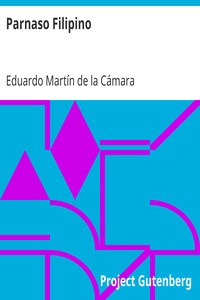Parnaso Filipino by Eduardo Martín de la Cámara
"Parnaso Filipino" by Eduardo Martín de la Cámara is a collection of poetry featuring Filipino poets written in the early 20th century. This anthology highlights the works of poets from the Philippine archipelago who express their sentiments and identities, largely through the lens of the Spanish language during the period of Spanish colonization. The anthology also provides a historical context for the development of Filipino poetry and raises themes of nationalism and
cultural identity. At the start of "Parnaso Filipino," the editor presents a prologue outlining the challenges and limitations faced by Filipino poets during Spanish rule, including issues of censorship and language barriers. The editor emphasizes that while the poems are by Filipino authors, they are mainly written in Spanish, reflecting a complex relationship with colonial influences. Several poets, including notable figures like José Rizal and Cecilio Apóstol, are mentioned for their significant contributions to Filipino literature. The prologue sets the stage for a rich tapestry of poetic expressions that resonate with themes of patriotism, freedom, and the unique Filipino experience, hinting at the diverse styles and voices represented within the collection. (This is an automatically generated summary.)
Read or download for free
| How to read | Url | Size | |||
|---|---|---|---|---|---|
| Read now! | https://www.gutenberg.org/ebooks/16201.html.images | 544 kB | |||
| EPUB3 (E-readers incl. Send-to-Kindle) | https://www.gutenberg.org/ebooks/16201.epub3.images | 349 kB | |||
| EPUB (older E-readers) | https://www.gutenberg.org/ebooks/16201.epub.images | 354 kB | |||
| EPUB (no images, older E-readers) | https://www.gutenberg.org/ebooks/16201.epub.noimages | 274 kB | |||
| Kindle | https://www.gutenberg.org/ebooks/16201.kf8.images | 663 kB | |||
| older Kindles | https://www.gutenberg.org/ebooks/16201.kindle.images | 558 kB | |||
| Plain Text UTF-8 | https://www.gutenberg.org/ebooks/16201.txt.utf-8 | 429 kB | |||
| Download HTML (zip) | https://www.gutenberg.org/cache/epub/16201/pg16201-h.zip | 329 kB | |||
| There may be more files related to this item. | |||||
Similar Books
About this eBook
| Author | Martín de la Cámara, Eduardo, 1873- |
|---|---|
| Title |
Parnaso Filipino Antología de Poetas del Archipelago Magellanico |
| Credits |
Produced by Michael Ciesielski, Mariano Cecowski and the Online Distributed Proofreading Team |
| Reading Level | Reading ease score: 59.2 (10th to 12th grade). Somewhat difficult to read. |
| Language | Spanish |
| LoC Class | PQ: Language and Literatures: Romance literatures: French, Italian, Spanish, Portuguese |
| Subject | Philippines -- Biography |
| Subject | Philippine poetry (Spanish) |
| Category | Text |
| EBook-No. | 16201 |
| Release Date | Jul 4, 2005 |
| Most Recently Updated | Dec 11, 2020 |
| Copyright Status | Public domain in the USA. |
| Downloads | 253 downloads in the last 30 days. |
| Project Gutenberg eBooks are always free! | |

